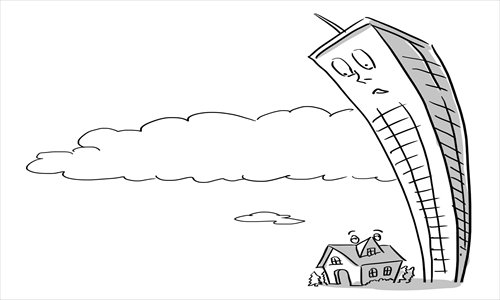Bigger not necessarily better, as Chengdu’s latest landmark shows

China is not in need of wonders. The Great Wall and Tiananmen Square are what foreign travelers come for. Nonetheless, China is ambitious. In a country where bigger means better, the largest building in the world seems to be an essential inclusion on the wonder list.
When the mammoth New Century Global Center opened in China's southwestern city of Chengdu last month with 1.7 million square meters of floor space, it was billed as the world's largest building. The centerpiece is a water park with a coast and beaches. It also has two five-star hotels and a luxury shopping mall.
Other impressive sites include an IMAX movie theater and a replica of a Mediterranean village. The opening of the center has attracted attention from the world media, who are prone to believe that the building is a testament to China's rapid economic development.
Having superlatives attached to any achievement indeed proves China's prowess in creating extraordinary things. In May, Beijing completed its subway line 10, which operates in a full circle.
With a length of 57 kilometers, it is the world's longest subway loop line. In the cultural field, Asia's largest music festival "Summer Sonic" is to be staged in Shanghai in August.
China is also obsessed with the word "global," as joining something global can mean that China is geared to international standards thanks to its rising influence in the world. Guangzhou will host the Badminton World Championships next month, and Wuhan will hold the Global Auto Forum in October.
However, hosting the "largest" or "global" this or that doesn't necessarily endow China with the greatest capability in those fields.
Although Shanghai is to host Asia's largest music festival, the music favored by youngsters is US or European rock'n'roll rather than Chinese ethnic melodies. At the upcoming Global Auto Forum, one can imagine that the brands that catch businessmen's eyes will be foreign rather than domestic ones.
The New Century landmark could be a sign that China's development has spread from its relatively rich eastern and southern regions to the west.
Chengdu, the capital of Sichuan Province and a booming tech industry hub, is home to a population of more than 14 million, while the wages there are lower and both the central and local governments have strived to take measures to boost the local economy.
However, its development level can hardly compare with that of metropolises such as Beijing, Shanghai and Guangzhou. The local people's purchasing power may turn the world's largest building into a burden that is too great to bear.
Whether Chengdu's largest building can be utilized to its fullest extent is still in question. Hopefully, it will not become a hotbed for official corruption.
Most of the time, what a building can convey are the values of those who built it and the people using it. Having the world's largest building may expand a city's reputation, but it doesn't necessarily improve the depth of the city's civilization and people's livelihood.
For Chengdu, its priority does not lie in showing off its limited wealth through a mammoth project or rushing to ascend to world-class city status. Rather, the priority lies in making every single effort to improve people's lives.
The author is a reporter with the Global Times. wangwenwen@globaltimes.com.cn
Related:
Fate of China’s skyscrapers will only continue to tower above rest